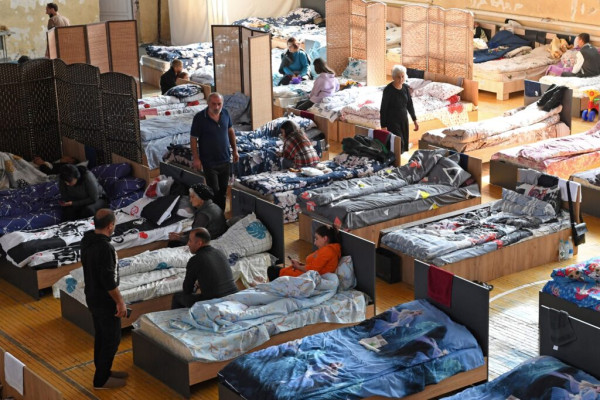Back off, Azerbaijan tells human rights critics ahead of COP29
Don’t bring your human rights concerns to Azerbaijan for COP29, one of the country’s top officials declared as criticism mounts of his government’s domestic record ahead of the annual climate summit.
Speaking to POLITICO, Azerbaijani foreign policy chief Hikmet Hajiyev blasted condemnation of the host country’s domestic record as a “coordinated smear campaign and dirty propaganda.”
“It is really disgusting — we perceive it as hostile acts against Azerbaijan,” said Hajiyev, a top adviser to Azerbaijani President Ilham Aliyev. “Overburdening the COP agenda with issues not having direct and immediate linkage to climate change is not helpful but detrimental.”
He added: “Climate change is based on science. There is no place for any ideology here."
The broadside comes just days after Human Rights Watch, the major global liberties watchdog, published a report warning that Azerbaijan had launched “a vicious attack on government critics, independent groups, and media” just weeks before it hosts thousands of senior politicians, diplomats, environmental experts and campaigners in November.
The NGO called on Western politicians to use the U.N.-backed talks to raise the cases of “arbitrarily detained” political prisoners, who civic campaigners say do not have access to fair trials. It also urged the EU to make its increasing energy ties with Azerbaijan contingent on human rights considerations, as Brussels turns to the oil and gas-rich South Caucasus nation to help replace Russian fossil fuels.
Last week, almost 60 U.S. lawmakers also signed an open letter urging Secretary of State Antony Blinken to use COP29 to "press for the immediate and unconditional release of all political prisoners, hostages and prisoners of war."
Azerbaijan has responded to the growing attention with pugilistic rhetoric. At a pre-COP meeting on Thursday in Baku, Azerbaijan’s capital, Aliyev echoed his foreign policy chief’s rhetoric.
“I cannot but touch upon the smear campaign by some media outlets aimed at tarnishing Azerbaijan’s image under false pretext,” he told attendees in a short address. “Such vain attempts cannot derail us from achieving our noble mission to cope with the negative impacts of climate change.”
Azerbaijan has said it wants to make this year’s COP a “COP of peace,” calling for truces between warring countries from Europe to the Middle East. However, that comes just a year after Azerbaijan launched a military offensive to take back its breakaway region of Nagorno-Karabakh, sparking a mass exodus of its 100,000 ethnic Armenian residents.
Baku has repeatedly accused the EU, and France in particular, of stoking tensions in the region by forging closer ties with Armenia and shipping military hardware to the country.
Granted anonymity to speak frankly, a senior Armenian diplomat said that COP was proving to be an important moment to highlight criticism of Azerbaijan.

“If the government in Baku is sincere in its aspirations, it should reciprocate Armenia’s proposal to sign the peace agreement [and] release all Armenian hostages," the diplomat said. "We are of an opinion that our partners have leverage in encouraging Azerbaijan to do so."
According to Hajiyev though, a deal is only possible if Armenia accepts it “needs to change its constitution as it contains territorial claims against Azerbaijan.”
Previous COP hosts, including the United Arab Emirates, which held last year's conference, have faced criticism for both their treatment of dissidents at home and their exports of oil and gas. Amnesty International accused Emirati leaders of ignoring calls to relax restrictions on free speech and assembly ahead of the summit.
“It’s patently clear that no state can have any credibility in addressing the climate crisis while continuing to tighten its chokehold on civil society," the NGO's secretary-general, Agnès Callamard, claimed in advance of the talks.
Hajiyev, however, was adamant that criticism of Azerbaijan’s domestic record or its relations with other countries would not be viewed as constructive by his own country.
“The world is watching, and history will judge us on the outcomes,” he said. “Azerbaijan will do everything in its power to play its role as a bridge between nations.”
He vowed that a major deal to set a new, more ambitious, climate finance target to help developing countries is within reach: “A historic agreement — a Baku Accord — must be reached.”